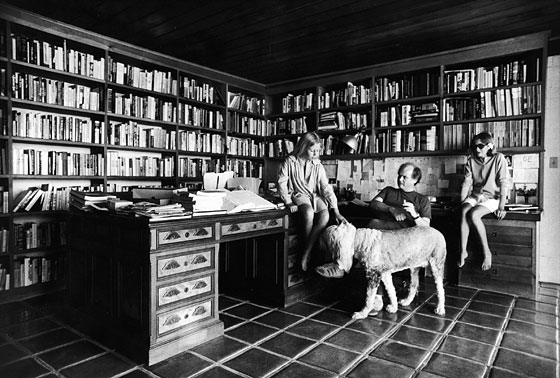Bread Givers Review “On the One Hand…But On the Other Hand”
This review is written for my fellow bibliophiles “The Bookbabes” to add to their discussion tonight in Albuquerque of Bread Givers. There is something incredibly moving about sitting in Poland in my “artist loft” writing while gazing over the view of Old and New World architecture. Ideas are flowing–too many for a coherent review drifting beautifully from one idea to the next–I give up–too many ideas, too little time. Anzia:
Less than three years before she died she wrote: ‘What makes writing so difficult? Isn’t it the blind craze to say too much?’
On the one hand, Bread Givers reads like a soap opera with stereotypical characters and a rags to riches story line: The males are misogynistic and conniving, the females downtrodden and compliant with the Old World traditions and the heroine successful with breaking free and achieving the American dream of independence. With photographs from the 1922 silent film version of Anzia Yezierska’s book Hungry Hearts scattered throughout the book the plot line seemed more melodramatic.
But on the other hand, Bread Givers is so much more: a clash between Old World traditions and perceived American values, a novel of proto feminism, a masterpiece of ethnic immigrant literature, the first Yiddish novel in America capturing the rhythms of Yiddish syntax by a first generation English speaker, a relevant novel of acculturation and assimilation, and a coming of age novel: more specifically a bildungsroman. (disclaimer: I ran out of time to build on Sara’s coming of age and Anzia’s relationship with John Dewey, but thought I’d still include the definition of a bildungsroman since I hadn’t heard of it before.)
Bildungsroman is a special kind of novel that focuses on the psychological and moral growth of its main character, from his or her youth to adulthood.
A bildungsroman is a story of the growing up of a sensitive person, who looks for answers to his questions through different experiences. Generally, such a novel starts with a loss or a tragedy that disturbs the main character emotionally. He or she leaves on a journey to fill that vacuum.
During the journey, the protagonist gains maturity, gradually and with difficulty. Usually, the plot depicts a conflict between the protagonist and the values of society. Finally, he or she accepts those values, and they are accepted by society, ending the dissatisfaction. Such a type of novel is also known as a “coming-of-age” novel. https://literarydevices.net/bildungsroman/
Without the introduction to the book by Alice Kessler-Harris and my own research into the novel, including the historical context and visiting the Jewish Quarter’s museums in Krakow I would not have understood and appreciated the tenets and struggles of the immigrant experience in this book and would have looked on it as too overemotional and overwrought.
Feeling a Kinship to Bread Givers
I am melancholy about the fact that I know so little about my grandparents. My grandfather Jacob Mueller came from Brigidau, Austria. It was part of Austrian Galicia which was considered the poorest province of Europe and many died from starvation and disease. At some point it became part of Poland. There were many Polish shtetls in Galicia and half of the ones listed on Wikipedia were in Galicia. Anzia Yezierska is said to be born in Polish Russia and the Galicia area could be described nowadays as Polish Russia. as the Galicia area in the 1890’s is shown on maps to be in parts of present day Poland and the Ukraine. Yezierska emigrated with her family around 1893 to the United States and I hypothesize my grandfather emigrated with his family around the early 1880’s.
My son-in-law emigrated to the United States from Bosnia when he was 16. I’ve never had a conversation with him about his acculturation, but I know he doesn’t think Americans appreciate the United States as much as they should. Perhaps this book will be jumping off point for conversations regarding his experiences.
The Central Metaphor: Insatiable Hunger
Reading I felt the physical hunger of Sara’s family and the other immigrants on Hester Street and the shame of being impoverished, but, more importantly, I felt the metaphorical hunger of all the characters. A few:
Mashah: Hunger for beauty and cleanliness.
But when the day for the wages came, Mashah quietly went to the…store and bought, not only a toothbrush and a separate towel for herself, but even a separate piece of soap.
…And from that day, the sight of her toothbrush on the shelf and her white, fancy towel by itself on the wall was like a sign to us all, that Mashah had no heart, no feeling…while the rest of us were wearing out our brains for only a bite in the mouth.
Bessie: Hunger for marriage and love
She looked after Berel Bernstein till she couldn’t see him any more. She didn’t say anything. But I could see her sink into herself as if all the life went out of her heart and she didn’t care about anything anymore.
Sara: Oy vey, what hunger! She hungers for one thing and finds she hungers for the opposite. For love, for knowledge, for upward mobility, for a door, for aloneness, for whiteness, for clean, airy emptiness, to “fit” in, for mealtime with family, for a man, for no husband, for her father’s approval, companionship of teachers who are friends…
I hated my stomach. It was like some clawing wild animal in me that I had to stop to feed always.
Overnight youth burst loose in me. And all because of a man. A man who look me out for one night’s pleasure. A fierce desire for life was let loose in me. I had tasted pleasure. And it burned in me for more, more.
My one need of needs, stronger than my life, was my love to be loved.
I felt as if all the beauty of the world that ever was ached in me to pour itself out on the people around. I felt like the sun so afire with life that it can’t help but shine on the whole world–the just and the unjust alike.
Nothing satisfies the hunger.
Further, this insight points out one of the great problems with “the American Dream”: it is one built of hope, but it is none too specific about what is to be hoped for. Any definition of a goal is going to be unsatisfactory, since the only attainable goals within American culture are material, and, as Golub points out, Yezierska’s heroines, “with their bellies full … hunger even more intensely. Still wailing their desires in the language of the mouth, they betray their longings to be more psychological than physiological” (1983, 54). Each of these heroines,
https://www.encyclopedia.com/arts/educational-magazines/bread-givers#Themes
Gender Inequality
The most influential person in Sara’s life, for better or worse, is her father. Reb Smolinsky the over-the- top character functions as a symbol of the oppression ways of the Old World. He brings his Old World views of women to America and smothers his daughters with tirades day in and day out belittling them until they are unable to resist their arranged marriages. He brings his family to ruin by refusing to listen to his “bread giver” wife and falls for a financial scam. And everyone of his excuses and justifications for his behavior and his hypocrisies is more misogynistic and manipulative than the last.
Blaming the victim!
You had a right to find out what kind of man your husband was before you married him…As you made your bed, so much you sleep on it.
Discounting women!
The prayers of his daughters didn’t count because God didn’t listen to women. Heaven and the next world were only for men.
Taking food from his starving daughters and wife!
The fat from the soup and top from the milk always went to him.
I’ve never wanted to throttle a fictional character as I have Reb Smolinsky. Ironically, Sara’s iron will “came” from somewhere and she is the only daughter who stands up to her father. In the end she sees her father in the same context of her own struggles with acculturation as she finds that her own intelligence and ambition are not enough to earn her place among the Americans she meets in college and she feels totally alone.
Even in college I had not escaped from the ghetto. Here loneliness hounded me even worse than in Hester Street. Was there no escape? Will I never lift myself to be a person among people?
Sara at last begins to understand her father.
I almost hated him again as I felt his tyranny–the tyranny with which he tried to crush me as child. Then suddenly the pathos of this lonely old man pierced me. In a world where all is changed, he alone remained unchanged–as tragically isolate as the rocks. All that he had left of life was his fanatical adherence to his traditions. It was within my power to keep lighted the flickering candle of his life for him. Could I deny him this poor service? Unconsciously, my hand reached out for his.
Thank you Nancy for selecting this book. It was so apropos to my experiences in Poland.
Atmosphere is everything.
About The Author
admin
Related Posts
The Year of Magical Thinking
Bookbabes, I will truly miss the thoughtful discussion of this book. High school in the…
March 10, 2018

The Days of Childhood
There are perhaps no days of our childhood we lived so fully as those we…
March 10, 2018
